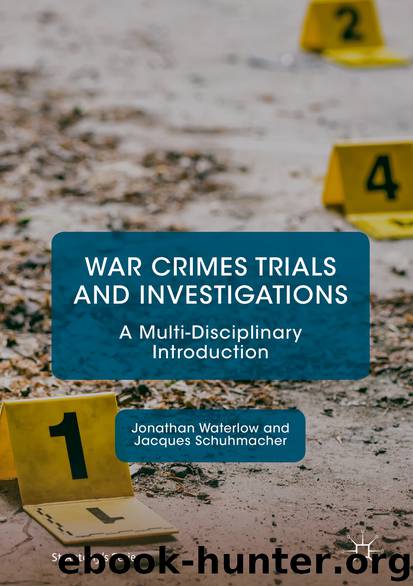War Crimes Trials and Investigations by Jonathan Waterlow & Jacques Schuhmacher

Author:Jonathan Waterlow & Jacques Schuhmacher
Language: eng
Format: epub
Publisher: Springer International Publishing, Cham
Interdisciplinary Issues
In the immediate post-war period, reflection on the experience of the Second World War was a decisive impulse for establishing Contemporary History as a legitimate sub-discipline of historiography. Moreover, this new branch of historiography was institutionalized to serve the needs of society. Decades later, the field received fresh impulses from a new wave of museumization of the recent past. In 1993, the United States Holocaust Memorial Museum was opened in Washington DC, and an important research institute was attached to it. This was an influential example to be followed by many states that decided to commemorate and study the Holocaust and other historical cases of mass atrocities. The Declaration of the Stockholm International Forum on the Holocaust in 2000 confirmed the continuing commitment of governments to stimulate Holocaust education.
In the process, it has become obvious that professional historiography can only help to generate better understanding if it manages to enhance its analytical tools and, for that reason, is also prepared to engage with other disciplines.
As suggested above, connections to legal, political, social, cultural, and behavioural sciences are vital in the conduct of intensive debates on causality, responsibility, and impact. Moreover, the scholarly and socio-political function of research in this field is also influenced by the institutional environment. In several countries, including the Netherlands, specialized institutes were commissioned for the production of historical knowledge, including forensic evidence. These aspects prove to be largely interconnected, and, as a consequence, those working in the field continuously change their roles, shuttling between the activities of working in archives, writing monographs for academic audiences, testifying in court, participating in war pension boards, and presenting points of view in the mass media. Consequently, working in multi-disciplinary and multi-purpose units creates a permanent challenge to maintaining the standards of the historical profession.
The history of the Institut d’Histoire du Temps Présent in Paris leads back to a Committee for the History of the Occupation and Liberation of France, founded in 1944 under the auspices of General de Gaulle’s provisional government. Likewise, two days after the Liberation in May 1945, the Dutch Rijksinstituut voor Oorlogsdocumentatie (‘State Institute for War Documentation’) was founded with the purpose of collecting archival and other collections to help post-war society, and posterity, to cope with and draw lessons from the experience of the Second World War. Other European institutions would share the purpose of working for the social interest, like the Institut für Zeitgeschichte in Munich, the Centre for Historical Research and Documentation on War and Society in Brussels, and the Institute of National Remembrance in Warsaw. In Israel, the Yad Vashem centre offered the example of a monument, a museum, and a research institute for the commemoration, exposition, and study of the Shoah.
In the work of the Amsterdam institute, the task of ‘documentation’ encompassed the whole range of collecting documents related to the Dutch in the Second World War, making these available for the public good, and bringing together a comprehensive body of sources for writing the history of occupation and repression.34
Download
This site does not store any files on its server. We only index and link to content provided by other sites. Please contact the content providers to delete copyright contents if any and email us, we'll remove relevant links or contents immediately.
2010-The City & the City by China Miéville(1528)
Anatomy of Injustice by Raymond Bonner(1273)
ADHD on Trial by Michael Gordon(1247)
That Every Man Be Armed by Stephen P. Halbrook(1245)
Injustices by Ian Millhiser(1204)
You Don't Own Me by Orly Lobel(1151)
Tell by Major Margaret Witt(1108)
A Vast Conspiracy by Jeffrey Toobin(1070)
Course Correction by Ginny Gilder(1054)
Broken Scales by Joel Cohen(1027)
J by Howard Jacobson(994)
First by Evan Thomas(993)
Without Copyrights by Spoo Robert(984)
The Run of His Life: The People v. O. J. Simpson by Jeffrey Toobin(966)
A Religious Orgy in Tennessee by H.L. Mencken(956)
A Triumph of Genius: Edwin Land, Polaroid, and the Kodak Patent War by Ronald K. Fierstein(911)
A History Of Thailand by Baker Chris(896)
Law 101: Everything You Need to Know About American Law, Fourth Edition by Jay Feinman(854)
John Wayne Gacy by Judge Sam Amirante(848)
